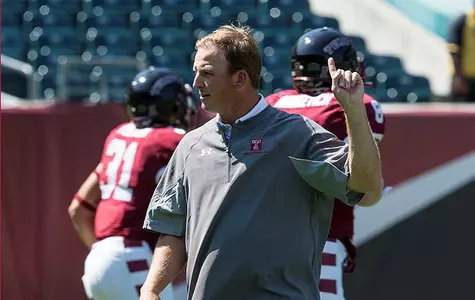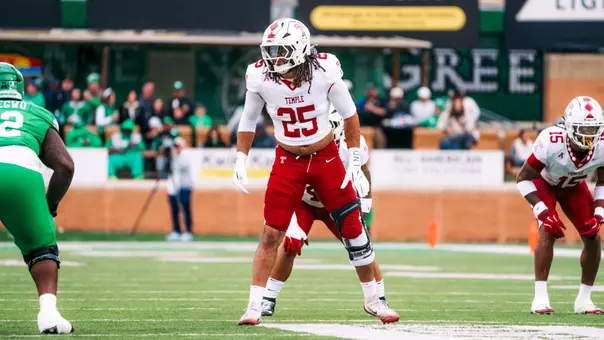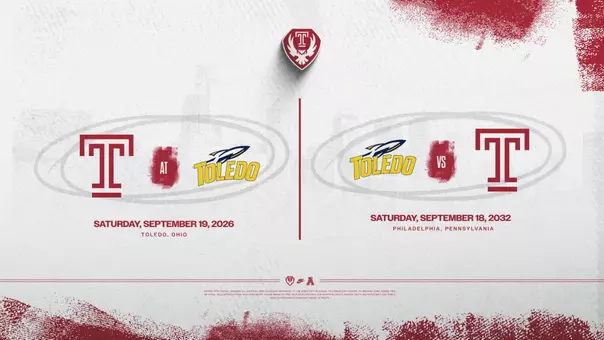Temple University Athletics

Photo by: Joseph V. Labolito/Temple University
Marcus Satterfield: Born to Coach
9.18.14 | Football
Growing up, a child's first role model is usually their parent. They want to be exactly like them; do everything they do and copy their every move.
For offensive coordinator Marcus Satterfield, these dreams were no different. His father, Bill, was a football coach for 40 years, including a 24 year stint at Greenback High School in Greenback, TN, where he amassed a 214-110 record. It was here that Marcus got his start on a football field.
"It was cool growing up from being a manager on the sidelines on Friday nights, carrying water bottles when I was in second grade, third grade, to being a ball boy, to being a freshmen in high school, playing junior varsity football," said Satterfield.
Satterfield played defense, wide receiver and quarterback under his dad's direction, which he used as a bonding time with his father.
"It's really neat to play for your dad and be able to share that time with him. I know a lot of people don't have the opportunity to do that, so it's neat," said Satterfield.
From Greenback, Satterfield went on to be a wide receiver and punter at East Tennessee State University in Johnson City. It was at this time he realized he had found his calling in life.
"I saw at an early age that I probably wasn't going to play in the NFL and I knew I wanted to coach. It transitioned from growing up thinking I wanted to be like my dad, be the high school coach at my high school to getting to college and realizing how awesome college football was," said Satterfield. "Then once I got in college, I knew I wanted to be a college football coach. Everything I did from a player stand point was to prepare to be the best player I could possibly be and then ultimately, when I got finished playing to be coach."
His inspiration, of course, came from the same man who helped build him from a ball boy to a player.
"It all came from my dad, and just being around it, to see how he could impact lives," said Marcus. "To see him take five or six kids home from practice every day, to make sure those kids were eating, make sure they had clothes, and the impact that he had on them. That was inspiration for me to be a coach."
Satterfield graduated from ETSU in 1999 and went on to be a graduate assistant at the University of Tennessee in 2002-03, where he was able to do a little bit of coaching, a great moment in his career.
"I think the coolest moment was in 2003. Our running backs coach at Tennessee took another job," said Satterfield. "And I, for a whole month, got to be the running backs coach when I was a graduate assistant."
Included in his short time as coach for the Volunteers was a trip to the Peach Bowl, where the team lost to Clemson.
Even while he was a graduate assistant in Knoxville, Satterfield's dad was always there to help him out.
"I was very fortunate, because when you're a GA, you have restricted earnings, and when you're coming up, you don't have any money," said Marcus. "I remember [my dad] and my mom, Dora Jane, telling me they knew this is what I wanted to do, and I was on scholarship in college for football, and they were going to help me for the first couple of years. Make sure I could pay rent, make sure I could eat, make sure I could function as a human and still develop as a coach."
Because of his parents, Satterfield was able get his coaching career started, in which his father had some words of wisdom for him.
"Keep your head down, work hard. Say 'yes sir, no sir.' If they ask you to scrape the gum off the road, you scrape the gum off the road, if they ask you to solve a blitz issue, you go solve a blitz issue, and treat both jobs the same. No job's too big, no job's too small," said Satterfield. "Prove that you can outwork everybody in the office; stay as late as you possibly can, get up as early as you possibly can and just always be around. That's what he said. Just work hard and things will happen."
Prior to coming to Temple in 2013, Satterfield had coaching stints at the University of Richmond, Western Carolina, University of Tennessee-Martin and University of Tennessee-Martin. And with each coaching job, he's modeled himself after in father in certain ways.
"Just how to treat people in the main thing. How to motivate and treat people, how to stay consistent," said Satterfield. "I think that all comes from him."
While he and his father aren't "systematically" the same, the "general day-to-day operations of being a coach" is where he takes the lessons from his father.
Aside from his father, Satterfield gained his knowledge from Randy Sanders, the offensive coordinator/quarterbacks coach during Satterfield's time at Tennessee.
"I really developed a bond with him that's still there today. He is more of a big brother figure for me," said Marcus. "I really lean on him a lot for decisions; life decisions, family decisions, really any decision out there I'll just call him and run it by him. He's been a person for the last ten years that's really been my guy that I lean on."
Another guy that Satterfield has relied on while learning the ropes was current head coach Matt Rhule, who was the assistant head coach and offensive line coach at Western Carolina University when Satterfield was the wide receivers coach in 2005.
"He's only a year older than me, but for first year that I knew him, I thought he was about six years older than me. He's always been mature for his age, his leadership skills were unbelievable," said Satterfield. "He mentored me when I was at Western Carolina, and like I said, he was a year older than me. I've always looked up to him, always knew he was going to be a head coach."
Before Rhule got the head coaching position at Temple, the two had an understanding that they'd be coaching together if one of them was ever promoted to head coach.
"He always told me 'hey, when I'm a head coach, I'm going to hire you' and I always said 'great, I'll sprint there,'" said Satterfield. "When he called me when he got the head job here, he said 'do you want to come?' and I said yes; he didn't even tell me what I was coaching, what I was making, anything. I just said 'yeah, let's go. I believe in you, I believe in what we're going to do.'"
Rhule and Satterfield have always had a good relationship, sharing "a lot of the same beliefs and thoughts" on how to work with the team, which Satterfield thinks would worry Rhule.
"We're a lot alike, which would scare him to hear that," said Marcus. "But we are a lot alike."
After Satterfield was added to the Temple coaching staff, he brought along a new way of doing things.
"I'm very ADD, literally ADD. People that work with me, I probably drive them crazy," said Satterfield. "But I think the unique thing I do is that it's fresh every day; there's not a stagnant ritual of 'we're going to do this, at this exact minute of this day for 14 hours, and this hour we're going to do this. It's always different and I think I'll always keep you on your toes."
As a coaching staff, Satterfield thinks it's important to not have a miserable attitude with your coworkers, especially when you're together for "14 hours in a little room."
If for some reason Rhule hadn't asked Satterfield to come along to Philadelphia, the hope for coaching would continue on a path to the professionals.
"[I'd coach] anyone in the NFL. Like anybody's dream to coach in the NFL, coach on Sundays, coach the greatest players in the world I think is always a dream," said Satterfield.
But, whether he's coaching on the turf at Chodoff Field or making it big time on Sundays, Satterfield will always be happy with the career path he chose.
"When you coach, after a while you just realize that it's not about one single moment. You could replace that with 'what's your favorite thing about coaching?' is the people that you meet, whether it be coaches or players," said Marcus. "The amount of players that touched my life, and hopefully we touched their life, and you're connected for the rest of your life in a positive way. And the different coaches you get to meet, and the coaches families and kids. The different sites and areas you get to see,
Even though there may be some sacrifices to be made during the season, Satterfield believes there is a big "positive" in the way football is constantly changing.
"It goes from fall season, to spring season, to recruiting, to spring recruiting, to summer, camps, to vacation, to coming back, to fall camp. I mean, it changes," said Satterfield. "You're here for two years, you're here for four years, you're here for five years, you're here for one year; you move around and get to meet people."
As ever changing as the profession he's in, the changing scenery has also been a pleasant one. In the transition from below the Mason-Dixon Line to the City of Brotherly Love, Satterfield feels like he fits into the northern way of life.
"I love it, I love the contrasting differences in the tempo of life. I don't think it shocked me, I embraced it and I love it," said Satterfield. "My personality fits it."
Even the rest of the Satterfield clan, which includes wife, Sarah and seven-year-old daughter, Harper, have adjusted well to life in a big city.
"I think my family's embraced it, especially in this city. Being this close to NY, we've been able to go to NY a few times," said Satterfield. "We have a seven-year-old daughter that can go see all kinds of great historical, American history right here at her backdoor."
While some may think that a move as big as Tennessee to Pennsylvania would create a huge sense of homesickness, Satterfield is happy where he is.
"I miss my family, my mom and dad. I miss the lakes, being able to have access to the lake where I lived. Other than that, there's really nothing I miss," said Satterfield. "I have my wife and daughter, our football team, a great football program, a great staff, great guys to work with. Life's pretty good for me right now."
However, the one thing that Pennsylvania is missing for Satterfield is the ability to indulge in his off-field hobby.
"I play golf. That may be the one thing I miss about Tennessee, I got to play golf," said Satterfield. "I don't know if it's the weather or the winter, but I played more golf. I love golf."
Satterfield, along with defensive coordinator Phil Snow and running backs coach Tyree Foreman will go out and play some rounds on the green "whenever we get the chance to get out of the office."
And, if there's ever a snow storm or a short relaxing period, Satterfield can always watch reruns of his guilty pleasure television show.
"I used to watch Beverly Hills 90210," said Satterfield. "I watched the first one, I watched the most recent one. I DVRed it, I admit. I haven't seen it in a while, since the last one went off."
And as far as comparing himself to one of the cast members?
"I'm probably like Brandon [Walsh, played by Jason Priestley], the mean girl's brother," said Satterfield. "I definitely wasn't Steve [Sanders, played by Ian Ziering]; Steve was the blonde one who was arrogant and obnoxious and was always in trouble."
For offensive coordinator Marcus Satterfield, these dreams were no different. His father, Bill, was a football coach for 40 years, including a 24 year stint at Greenback High School in Greenback, TN, where he amassed a 214-110 record. It was here that Marcus got his start on a football field.
"It was cool growing up from being a manager on the sidelines on Friday nights, carrying water bottles when I was in second grade, third grade, to being a ball boy, to being a freshmen in high school, playing junior varsity football," said Satterfield.
Satterfield played defense, wide receiver and quarterback under his dad's direction, which he used as a bonding time with his father.
"It's really neat to play for your dad and be able to share that time with him. I know a lot of people don't have the opportunity to do that, so it's neat," said Satterfield.
From Greenback, Satterfield went on to be a wide receiver and punter at East Tennessee State University in Johnson City. It was at this time he realized he had found his calling in life.
"I saw at an early age that I probably wasn't going to play in the NFL and I knew I wanted to coach. It transitioned from growing up thinking I wanted to be like my dad, be the high school coach at my high school to getting to college and realizing how awesome college football was," said Satterfield. "Then once I got in college, I knew I wanted to be a college football coach. Everything I did from a player stand point was to prepare to be the best player I could possibly be and then ultimately, when I got finished playing to be coach."
His inspiration, of course, came from the same man who helped build him from a ball boy to a player.
"It all came from my dad, and just being around it, to see how he could impact lives," said Marcus. "To see him take five or six kids home from practice every day, to make sure those kids were eating, make sure they had clothes, and the impact that he had on them. That was inspiration for me to be a coach."
Satterfield graduated from ETSU in 1999 and went on to be a graduate assistant at the University of Tennessee in 2002-03, where he was able to do a little bit of coaching, a great moment in his career.
"I think the coolest moment was in 2003. Our running backs coach at Tennessee took another job," said Satterfield. "And I, for a whole month, got to be the running backs coach when I was a graduate assistant."
Included in his short time as coach for the Volunteers was a trip to the Peach Bowl, where the team lost to Clemson.
Even while he was a graduate assistant in Knoxville, Satterfield's dad was always there to help him out.
"I was very fortunate, because when you're a GA, you have restricted earnings, and when you're coming up, you don't have any money," said Marcus. "I remember [my dad] and my mom, Dora Jane, telling me they knew this is what I wanted to do, and I was on scholarship in college for football, and they were going to help me for the first couple of years. Make sure I could pay rent, make sure I could eat, make sure I could function as a human and still develop as a coach."
Because of his parents, Satterfield was able get his coaching career started, in which his father had some words of wisdom for him.
"Keep your head down, work hard. Say 'yes sir, no sir.' If they ask you to scrape the gum off the road, you scrape the gum off the road, if they ask you to solve a blitz issue, you go solve a blitz issue, and treat both jobs the same. No job's too big, no job's too small," said Satterfield. "Prove that you can outwork everybody in the office; stay as late as you possibly can, get up as early as you possibly can and just always be around. That's what he said. Just work hard and things will happen."
Prior to coming to Temple in 2013, Satterfield had coaching stints at the University of Richmond, Western Carolina, University of Tennessee-Martin and University of Tennessee-Martin. And with each coaching job, he's modeled himself after in father in certain ways.
"Just how to treat people in the main thing. How to motivate and treat people, how to stay consistent," said Satterfield. "I think that all comes from him."
While he and his father aren't "systematically" the same, the "general day-to-day operations of being a coach" is where he takes the lessons from his father.
Aside from his father, Satterfield gained his knowledge from Randy Sanders, the offensive coordinator/quarterbacks coach during Satterfield's time at Tennessee.
"I really developed a bond with him that's still there today. He is more of a big brother figure for me," said Marcus. "I really lean on him a lot for decisions; life decisions, family decisions, really any decision out there I'll just call him and run it by him. He's been a person for the last ten years that's really been my guy that I lean on."
Another guy that Satterfield has relied on while learning the ropes was current head coach Matt Rhule, who was the assistant head coach and offensive line coach at Western Carolina University when Satterfield was the wide receivers coach in 2005.
"He's only a year older than me, but for first year that I knew him, I thought he was about six years older than me. He's always been mature for his age, his leadership skills were unbelievable," said Satterfield. "He mentored me when I was at Western Carolina, and like I said, he was a year older than me. I've always looked up to him, always knew he was going to be a head coach."
Before Rhule got the head coaching position at Temple, the two had an understanding that they'd be coaching together if one of them was ever promoted to head coach.
"He always told me 'hey, when I'm a head coach, I'm going to hire you' and I always said 'great, I'll sprint there,'" said Satterfield. "When he called me when he got the head job here, he said 'do you want to come?' and I said yes; he didn't even tell me what I was coaching, what I was making, anything. I just said 'yeah, let's go. I believe in you, I believe in what we're going to do.'"
Rhule and Satterfield have always had a good relationship, sharing "a lot of the same beliefs and thoughts" on how to work with the team, which Satterfield thinks would worry Rhule.
"We're a lot alike, which would scare him to hear that," said Marcus. "But we are a lot alike."
After Satterfield was added to the Temple coaching staff, he brought along a new way of doing things.
"I'm very ADD, literally ADD. People that work with me, I probably drive them crazy," said Satterfield. "But I think the unique thing I do is that it's fresh every day; there's not a stagnant ritual of 'we're going to do this, at this exact minute of this day for 14 hours, and this hour we're going to do this. It's always different and I think I'll always keep you on your toes."
As a coaching staff, Satterfield thinks it's important to not have a miserable attitude with your coworkers, especially when you're together for "14 hours in a little room."
If for some reason Rhule hadn't asked Satterfield to come along to Philadelphia, the hope for coaching would continue on a path to the professionals.
"[I'd coach] anyone in the NFL. Like anybody's dream to coach in the NFL, coach on Sundays, coach the greatest players in the world I think is always a dream," said Satterfield.
But, whether he's coaching on the turf at Chodoff Field or making it big time on Sundays, Satterfield will always be happy with the career path he chose.
"When you coach, after a while you just realize that it's not about one single moment. You could replace that with 'what's your favorite thing about coaching?' is the people that you meet, whether it be coaches or players," said Marcus. "The amount of players that touched my life, and hopefully we touched their life, and you're connected for the rest of your life in a positive way. And the different coaches you get to meet, and the coaches families and kids. The different sites and areas you get to see,
Even though there may be some sacrifices to be made during the season, Satterfield believes there is a big "positive" in the way football is constantly changing.
"It goes from fall season, to spring season, to recruiting, to spring recruiting, to summer, camps, to vacation, to coming back, to fall camp. I mean, it changes," said Satterfield. "You're here for two years, you're here for four years, you're here for five years, you're here for one year; you move around and get to meet people."
As ever changing as the profession he's in, the changing scenery has also been a pleasant one. In the transition from below the Mason-Dixon Line to the City of Brotherly Love, Satterfield feels like he fits into the northern way of life.
"I love it, I love the contrasting differences in the tempo of life. I don't think it shocked me, I embraced it and I love it," said Satterfield. "My personality fits it."
Even the rest of the Satterfield clan, which includes wife, Sarah and seven-year-old daughter, Harper, have adjusted well to life in a big city.
"I think my family's embraced it, especially in this city. Being this close to NY, we've been able to go to NY a few times," said Satterfield. "We have a seven-year-old daughter that can go see all kinds of great historical, American history right here at her backdoor."
While some may think that a move as big as Tennessee to Pennsylvania would create a huge sense of homesickness, Satterfield is happy where he is.
"I miss my family, my mom and dad. I miss the lakes, being able to have access to the lake where I lived. Other than that, there's really nothing I miss," said Satterfield. "I have my wife and daughter, our football team, a great football program, a great staff, great guys to work with. Life's pretty good for me right now."
However, the one thing that Pennsylvania is missing for Satterfield is the ability to indulge in his off-field hobby.
"I play golf. That may be the one thing I miss about Tennessee, I got to play golf," said Satterfield. "I don't know if it's the weather or the winter, but I played more golf. I love golf."
Satterfield, along with defensive coordinator Phil Snow and running backs coach Tyree Foreman will go out and play some rounds on the green "whenever we get the chance to get out of the office."
And, if there's ever a snow storm or a short relaxing period, Satterfield can always watch reruns of his guilty pleasure television show.
"I used to watch Beverly Hills 90210," said Satterfield. "I watched the first one, I watched the most recent one. I DVRed it, I admit. I haven't seen it in a while, since the last one went off."
And as far as comparing himself to one of the cast members?
"I'm probably like Brandon [Walsh, played by Jason Priestley], the mean girl's brother," said Satterfield. "I definitely wasn't Steve [Sanders, played by Ian Ziering]; Steve was the blonde one who was arrogant and obnoxious and was always in trouble."
2026 Fencing Philadelphia Invitational - Strip 3
Saturday, January 17
2026 Fencing Philadelphia Invitational - Strip 2
Saturday, January 17
2026 Fencing Philadelphia Invitational - Strip 1
Saturday, January 17
Strip 3 - Fencing Philadelphia Invitational
Friday, January 16















